外研版初中英语八年级上册 Module 1 Unit 1 Let's try to speak English as much as possible.教案
文档属性
| 名称 | 外研版初中英语八年级上册 Module 1 Unit 1 Let's try to speak English as much as possible.教案 |
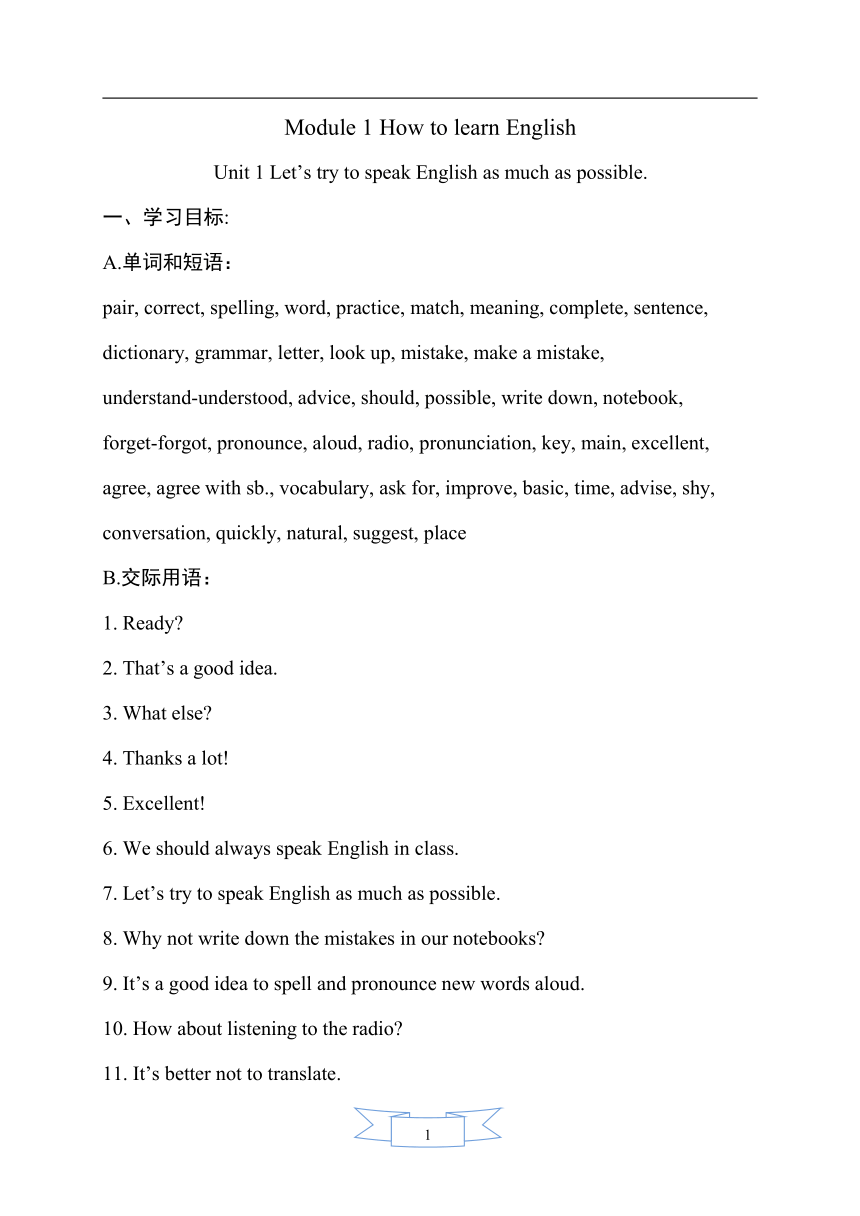
|
|
| 格式 | doc | ||
| 文件大小 | 61.5KB | ||
| 资源类型 | 教案 | ||
| 版本资源 | 外研版 | ||
| 科目 | 英语 | ||
| 更新时间 | 2024-06-06 00:00:00 | ||
图片预览

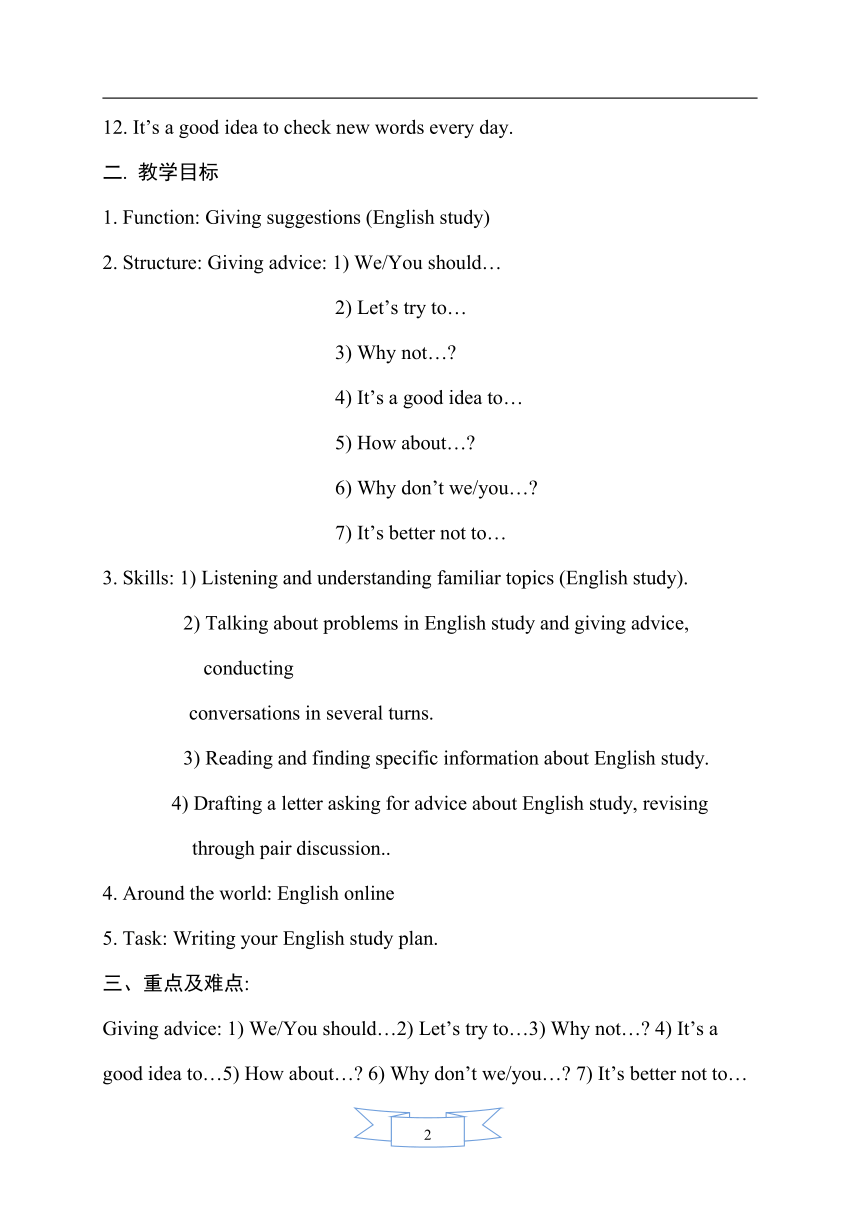
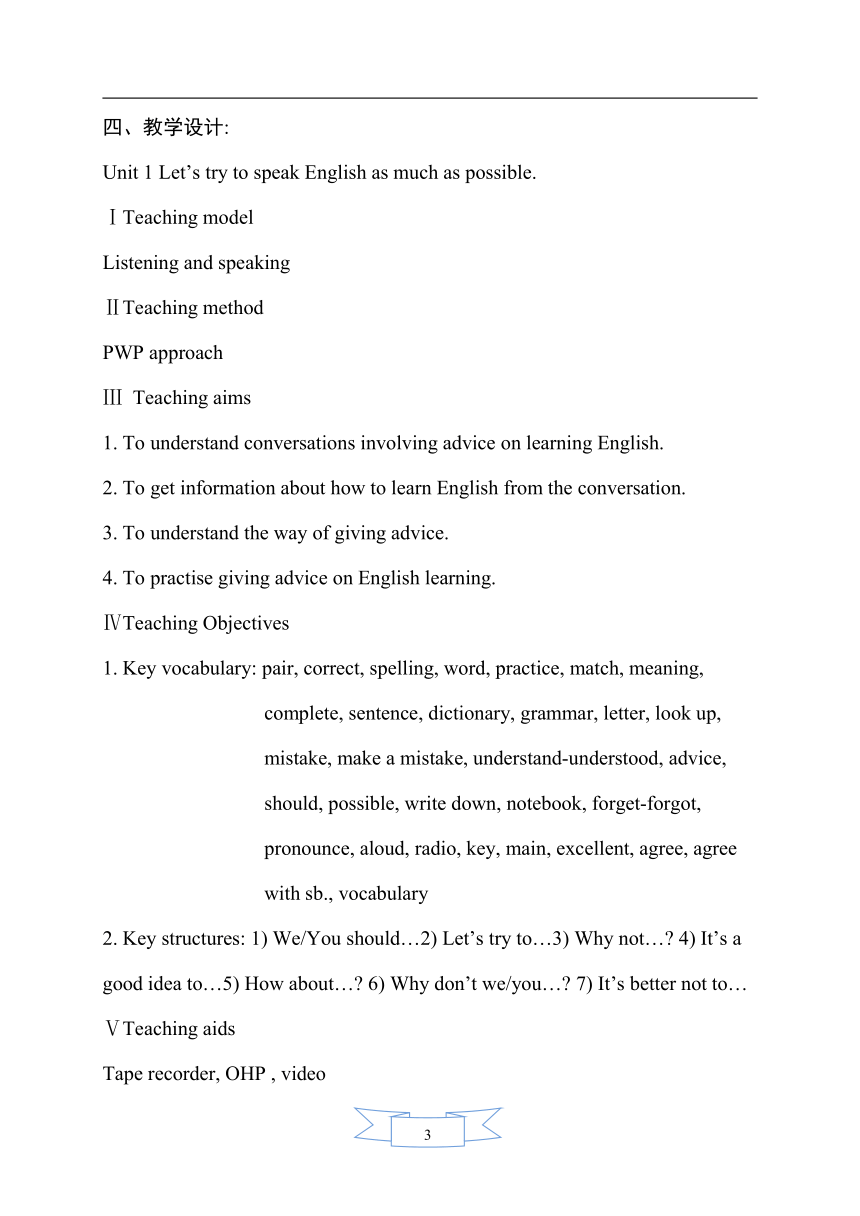
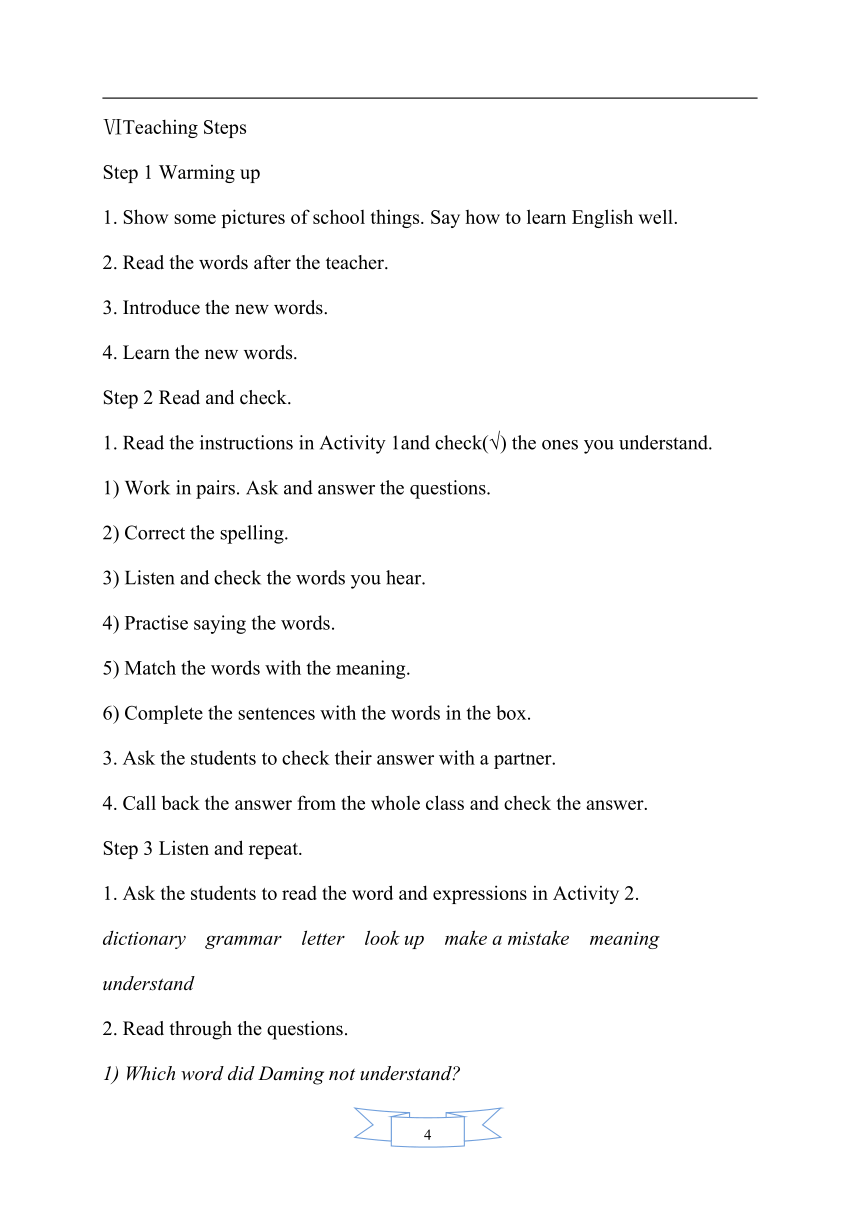
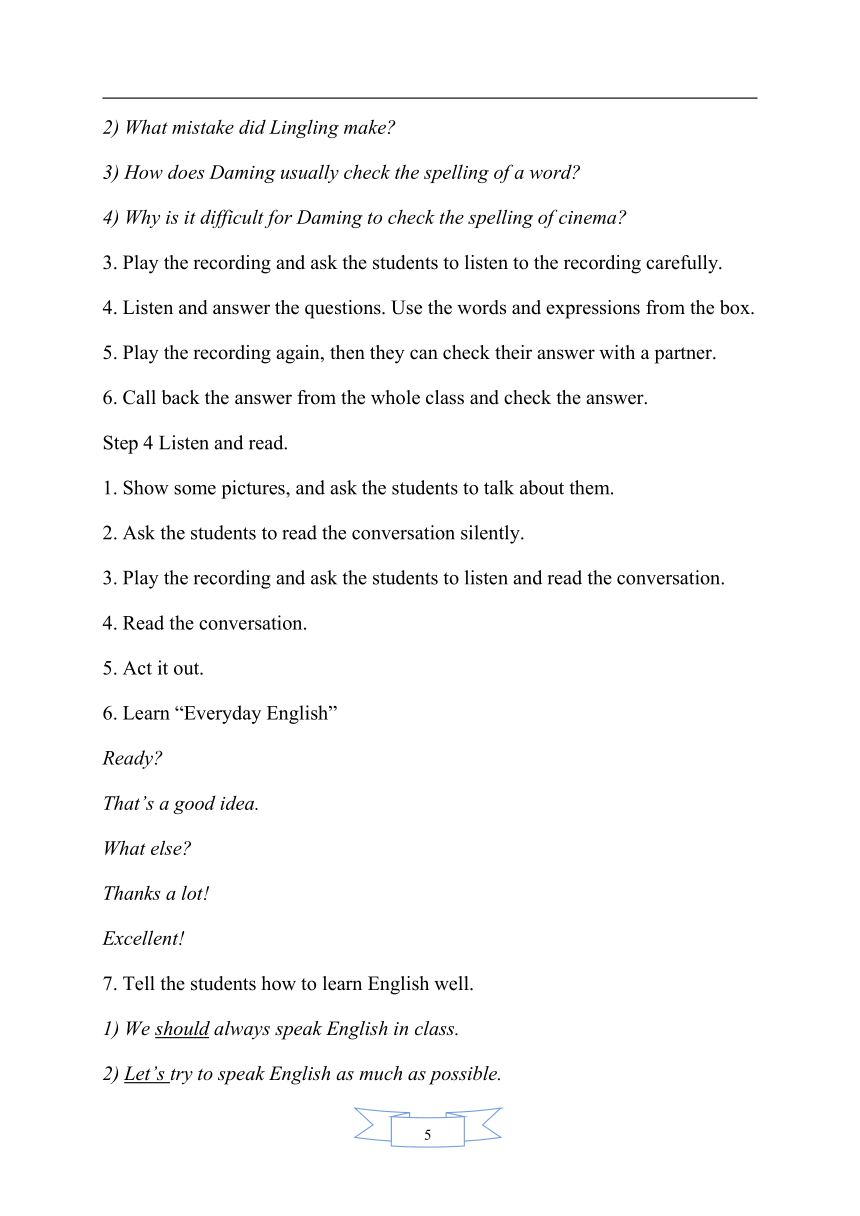
文档简介
Module 1 How to learn English
Unit 1 Let’s try to speak English as much as possible.
一、学习目标:
A.单词和短语:
pair, correct, spelling, word, practice, match, meaning, complete, sentence, dictionary, grammar, letter, look up, mistake, make a mistake, understand-understood, advice, should, possible, write down, notebook, forget-forgot, pronounce, aloud, radio, pronunciation, key, main, excellent, agree, agree with sb., vocabulary, ask for, improve, basic, time, advise, shy, conversation, quickly, natural, suggest, place
B.交际用语:
1. Ready
2. That’s a good idea.
3. What else
4. Thanks a lot!
5. Excellent!
6. We should always speak English in class.
7. Let’s try to speak English as much as possible.
8. Why not write down the mistakes in our notebooks
9. It’s a good idea to spell and pronounce new words aloud.
10. How about listening to the radio
11. It’s better not to translate.
12. It’s a good idea to check new words every day.
二. 教学目标
1. Function: Giving suggestions (English study)
2. Structure: Giving advice: 1) We/You should…
2) Let’s try to…
3) Why not…
4) It’s a good idea to…
5) How about…
6) Why don’t we/you…
7) It’s better not to…
3. Skills: 1) Listening and understanding familiar topics (English study).
2) Talking about problems in English study and giving advice, conducting
conversations in several turns.
3) Reading and finding specific information about English study.
4) Drafting a letter asking for advice about English study, revising through pair discussion..
4. Around the world: English online
5. Task: Writing your English study plan.
三、重点及难点:
Giving advice: 1) We/You should…2) Let’s try to…3) Why not… 4) It’s a good idea to…5) How about… 6) Why don’t we/you… 7) It’s better not to…
四、教学设计:
Unit 1 Let’s try to speak English as much as possible.
ⅠTeaching model
Listening and speaking
ⅡTeaching method
PWP approach
Ⅲ Teaching aims
1. To understand conversations involving advice on learning English.
2. To get information about how to learn English from the conversation.
3. To understand the way of giving advice.
4. To practise giving advice on English learning.
ⅣTeaching Objectives
1. Key vocabulary: pair, correct, spelling, word, practice, match, meaning, complete, sentence, dictionary, grammar, letter, look up, mistake, make a mistake, understand-understood, advice, should, possible, write down, notebook, forget-forgot, pronounce, aloud, radio, key, main, excellent, agree, agree with sb., vocabulary
2. Key structures: 1) We/You should…2) Let’s try to…3) Why not… 4) It’s a good idea to…5) How about… 6) Why don’t we/you… 7) It’s better not to…
ⅤTeaching aids
Tape recorder, OHP , video
ⅥTeaching Steps
Step 1 Warming up
1. Show some pictures of school things. Say how to learn English well.
2. Read the words after the teacher.
3. Introduce the new words.
4. Learn the new words.
Step 2 Read and check.
1. Read the instructions in Activity 1and check(√) the ones you understand.
1) Work in pairs. Ask and answer the questions.
2) Correct the spelling.
3) Listen and check the words you hear.
4) Practise saying the words.
5) Match the words with the meaning.
6) Complete the sentences with the words in the box.
3. Ask the students to check their answer with a partner.
4. Call back the answer from the whole class and check the answer.
Step 3 Listen and repeat.
1. Ask the students to read the word and expressions in Activity 2.
dictionary grammar letter look up make a mistake meaning understand
2. Read through the questions.
1) Which word did Daming not understand
2) What mistake did Lingling make
3) How does Daming usually check the spelling of a word
4) Why is it difficult for Daming to check the spelling of cinema
3. Play the recording and ask the students to listen to the recording carefully.
4. Listen and answer the questions. Use the words and expressions from the box.
5. Play the recording again, then they can check their answer with a partner.
6. Call back the answer from the whole class and check the answer.
Step 4 Listen and read.
1. Show some pictures, and ask the students to talk about them.
2. Ask the students to read the conversation silently.
3. Play the recording and ask the students to listen and read the conversation.
4. Read the conversation.
5. Act it out.
6. Learn “Everyday English”
Ready
That’s a good idea.
What else
Thanks a lot!
Excellent!
7. Tell the students how to learn English well.
1) We should always speak English in class.
2) Let’s try to speak English as much as possible.
3) Why not write down the mistakes in our notebooks
4) Don’t forget to write down the correct answers next to the mistakes.
5) It’s a good idea to spell and pronounce new words aloud every day.
6) How about listening to the radio
7) How about reading English stories
8) Why don’t we try to find some English pen friends
Step 5 Writing.
1. Read the conversation again.
2. Ask the students to write notes about learning English.
Listening : listen to the radio
Speaking : ___________________________________________________
Reading : ____________________________________________________
Writing: ____________________________________________________
Learning new words: ___________________________________________
3. Ask the students to check with a partner.
4. Check the answers:
Keys:
Listening : listen to the radio
Speaking : speak English as much as possible
Reading : read an English stories
Writing: write to pen friends, write down our mistakes in our notebooks, write down the correct answers next to the mistakes
Learning new words: spell and pronounce new words aloud every day
Step 6 Underline the correct words and expressions.
1. Ask the students to read through the passage in Activity 4.
Here’s my (1) advice / notebook about learning English. Speak English (2) always / as much as possible in class, and listen to English (3) in the newspaper / on the radio. I (4) agree / forget it’s a good idea to look up new worlds in the ( 5) notebook / dictionary. You can find the (6) correct / excellent pronunciation and learn the meaning
2. Underline the correct words and expressions.
3. Check with a partner.
4. Call back the answers from the whole class.
Keys: 1. advice 2. as much as possible 3. on the radio 4. agree 5. dictionary 6. correct 5. Read the passage together.
Step 7 Listen and repeat.
1. Play the recording once without stopping.
2. Play the recording again and ask the whole class to repeat.
1) We should always speak English in class.
2) Let’s try to speak English as much as possible.
3) Why not write down the mistakes in our notebooks
4) It’s a good idea to spell and pronounce new words aloud.
5) How about listening to the radio
3. Ask the students to listen and mark the intonation.
4. Now listen again and repeat.
Step 8 Work in pairs.
1. Talk about problems and give advice.
Problems Advice
I can’t… How / What about …
I don’t know… Why not / don’t you …
2. Read through the example with the class.
—I can’t speak English well. What should I do
—Why don’t you try to talk to our classmates in English?
3. Work in pairs.
Step 9 Important and difficult points
1 Why not write down our mistakes in our notebooks
何不在笔记本上把我们的错误记下来?
Why not … 用来表示提出某种建议,而不是询问为什么不做某事的原因,例如:
Why not take a walk in the park
何不在公园里散散步?
我们还可以用下面的表达方式来提建议:
Why don’t we drive to the country
我们何不开车去乡下?
What / How about going to Europe for a holiday
去欧洲度假怎么样?
Write down 或者put down 表示“记下,写下”。例如:
I’ll write the prices down on the back of this book.
我会把价钱记在这本书的背面的。
Why not put down your ideas in your notebook
何不把你的想法记在笔记本上?
2 And don’t forget to write down the correct answers next to the mistakes. What else 但是不要忘记把正确答案写在错误答案的旁边。还有吗?
else 通常用在疑问词后面,可以表示“另外的,别的”。例如:
We have said we’re sorry. What else can we say
我们已经道过歉了。还能说些什么呢?
If I can’t trust you, who else can I trust
如果不能相信你,我还能相信谁呢?
The book isn’t here. Where else should I took
那本书不在这里。我应该再去哪里找呢?
Step 10 Do exercises:
一、翻译下列短语:
1.犯错________________ 2.写下________________
3.同意某人________________ 4.谈论________________
5.给某人一些建议________________ 6.试着去做________________
7.尽量多________________ 8.为何不做某事________________
9.让我们一起做某事________________ 10.在我们的笔记里______________
11.好主意________________ 12.不要忘记去做某事_____________
13.正确的答案________________ 14.别的什么事________________
15.好主意去做某事________________ 16.检查新单词________________
17.去做某事怎样________________ 18.听收音机________________
19. 读英语报纸________________ 20.最好不要去做某事____________
21.不必去做某事________________ 22.一样重要________________
23.彼此写信________________
Keys:
1. make a mistake 2. write down 3. agree with sb. 4. talk about 5. give sb. some advice 6. try to do 7.as much as possible 8.Why not do sth.9. Let’s do sth. 10. in our notebooks 11.That’s a good idea 12. don’t forget to do sth. 13. the correct answers 14. What else 15. It’s a good idea to do 16. check new words 17.How about doing sth. 18. listen to the radio 19. read an English newspaper 20. it's better not to do sth.21. don’t need to do sth. 22. as important as 23. write to each other.
二、完成句子:
1.我将给你们一些学英语的建议。
I’m going to __________________ about studying English.
2. 课堂上你应该总是说英语。
You ___________________ English in class
3. 我和我的笔友互相发电子邮件。
My pen friend and I _________________ each other
4. 不要忘记每天检查你的词汇本。
__________________ your vocabulary notebook every day.
5. 尽量不要逐字翻译。
__________________ every word.
6. 为什么不把你的正确拼写写在错误旁边呢?
__________________ the correct spelling next to the mistakes?
7. 你还想知道别的什么事?
__________________ do you want to know
8. 我完全同意你的意见。
I quite ________________ you.
9. 我认为写与读一样重要。
I think writing is _________________ reading
Keys:
1. give you some advice 2. should always speak 3. send e-mails to
4. Don’t forget to check 5. Try not to translate 6. Why not write down
7. What else 8. agree with 9. as important as
三、中考链接
( ) 1. — How about going camping in the mountain
— _____________ .
A. Me, too B. Good idea C. It doesn’t matter D. Help yourself
( ) 2. When you don’t know a word, you can _____ in the dictionary.
A. look it up B. set it up C. give it up D. pick it up
( ) 3.—Why couldn't you______ the correct spelling of the word
—Err. . . I hadn't got a Chinese-English dictionary at hand.
A. look for B. look down C. look up D. look at
( ) 4. —Why not get your husband a CD player for his birthday
—________. That’s too expensive.
A. Good idea! B. I agree with you. C. No way! D. Not at all.
( ) 5. —Where is Grace
—She _____ in the yard.
A. reads B. read C. is reading D. was reading
( ) 6. I often_______ my homework after supper. But yesterday evening, I ________ TV.
A. do; watch B. did; watched C. did; watch D. do; watched
( ) 7. Remember _______ your personal information to strangers. It's dangerous.
A. to tell B. not to tell C. not tell
( ) 8. —It's going to rain. Remember ______ an umbrella when you go to school.
—All right, Mom.
A.taking B.bringing C.to take D.to bring
( ) 9. —The said sorry to me, but I wouldn’t listen.
—It is foolish of you _______ others for the mistakes.
A. forgive B. not forgive C. to forgive D. not to forgive
( ) 10. One of the difficulties we have ______ English is ho to remember new words and expressions .
A. to learn B. in learning C. learn D. learned
( ) 11.I spent a lot of time ______ English last week.
A. to practice speaking B. practicing to speak C. practicing speaking
( ) 12. —Shall we go and _____ hello to the foreign teachers
—Good idea ! Let’s go.
A. say B. speak C. talk D. shout
( ) 13. “ Don’t _____ to strangers on your way to and from school”, my mother often ____ to me.
A. speak, says B. speak , tells C. talk; speaks D. talk , tells
Keys: 1. B 2. A 3. C 4. C 5. C 6. D 7. B 8. C 9. D 10. B
11. C 12. A 13. A
Step 11 Homework
Remember the words of Unit 1 and prepare the text of Unit 2.
Unit 1 Let’s try to speak English as much as possible.
一、学习目标:
A.单词和短语:
pair, correct, spelling, word, practice, match, meaning, complete, sentence, dictionary, grammar, letter, look up, mistake, make a mistake, understand-understood, advice, should, possible, write down, notebook, forget-forgot, pronounce, aloud, radio, pronunciation, key, main, excellent, agree, agree with sb., vocabulary, ask for, improve, basic, time, advise, shy, conversation, quickly, natural, suggest, place
B.交际用语:
1. Ready
2. That’s a good idea.
3. What else
4. Thanks a lot!
5. Excellent!
6. We should always speak English in class.
7. Let’s try to speak English as much as possible.
8. Why not write down the mistakes in our notebooks
9. It’s a good idea to spell and pronounce new words aloud.
10. How about listening to the radio
11. It’s better not to translate.
12. It’s a good idea to check new words every day.
二. 教学目标
1. Function: Giving suggestions (English study)
2. Structure: Giving advice: 1) We/You should…
2) Let’s try to…
3) Why not…
4) It’s a good idea to…
5) How about…
6) Why don’t we/you…
7) It’s better not to…
3. Skills: 1) Listening and understanding familiar topics (English study).
2) Talking about problems in English study and giving advice, conducting
conversations in several turns.
3) Reading and finding specific information about English study.
4) Drafting a letter asking for advice about English study, revising through pair discussion..
4. Around the world: English online
5. Task: Writing your English study plan.
三、重点及难点:
Giving advice: 1) We/You should…2) Let’s try to…3) Why not… 4) It’s a good idea to…5) How about… 6) Why don’t we/you… 7) It’s better not to…
四、教学设计:
Unit 1 Let’s try to speak English as much as possible.
ⅠTeaching model
Listening and speaking
ⅡTeaching method
PWP approach
Ⅲ Teaching aims
1. To understand conversations involving advice on learning English.
2. To get information about how to learn English from the conversation.
3. To understand the way of giving advice.
4. To practise giving advice on English learning.
ⅣTeaching Objectives
1. Key vocabulary: pair, correct, spelling, word, practice, match, meaning, complete, sentence, dictionary, grammar, letter, look up, mistake, make a mistake, understand-understood, advice, should, possible, write down, notebook, forget-forgot, pronounce, aloud, radio, key, main, excellent, agree, agree with sb., vocabulary
2. Key structures: 1) We/You should…2) Let’s try to…3) Why not… 4) It’s a good idea to…5) How about… 6) Why don’t we/you… 7) It’s better not to…
ⅤTeaching aids
Tape recorder, OHP , video
ⅥTeaching Steps
Step 1 Warming up
1. Show some pictures of school things. Say how to learn English well.
2. Read the words after the teacher.
3. Introduce the new words.
4. Learn the new words.
Step 2 Read and check.
1. Read the instructions in Activity 1and check(√) the ones you understand.
1) Work in pairs. Ask and answer the questions.
2) Correct the spelling.
3) Listen and check the words you hear.
4) Practise saying the words.
5) Match the words with the meaning.
6) Complete the sentences with the words in the box.
3. Ask the students to check their answer with a partner.
4. Call back the answer from the whole class and check the answer.
Step 3 Listen and repeat.
1. Ask the students to read the word and expressions in Activity 2.
dictionary grammar letter look up make a mistake meaning understand
2. Read through the questions.
1) Which word did Daming not understand
2) What mistake did Lingling make
3) How does Daming usually check the spelling of a word
4) Why is it difficult for Daming to check the spelling of cinema
3. Play the recording and ask the students to listen to the recording carefully.
4. Listen and answer the questions. Use the words and expressions from the box.
5. Play the recording again, then they can check their answer with a partner.
6. Call back the answer from the whole class and check the answer.
Step 4 Listen and read.
1. Show some pictures, and ask the students to talk about them.
2. Ask the students to read the conversation silently.
3. Play the recording and ask the students to listen and read the conversation.
4. Read the conversation.
5. Act it out.
6. Learn “Everyday English”
Ready
That’s a good idea.
What else
Thanks a lot!
Excellent!
7. Tell the students how to learn English well.
1) We should always speak English in class.
2) Let’s try to speak English as much as possible.
3) Why not write down the mistakes in our notebooks
4) Don’t forget to write down the correct answers next to the mistakes.
5) It’s a good idea to spell and pronounce new words aloud every day.
6) How about listening to the radio
7) How about reading English stories
8) Why don’t we try to find some English pen friends
Step 5 Writing.
1. Read the conversation again.
2. Ask the students to write notes about learning English.
Listening : listen to the radio
Speaking : ___________________________________________________
Reading : ____________________________________________________
Writing: ____________________________________________________
Learning new words: ___________________________________________
3. Ask the students to check with a partner.
4. Check the answers:
Keys:
Listening : listen to the radio
Speaking : speak English as much as possible
Reading : read an English stories
Writing: write to pen friends, write down our mistakes in our notebooks, write down the correct answers next to the mistakes
Learning new words: spell and pronounce new words aloud every day
Step 6 Underline the correct words and expressions.
1. Ask the students to read through the passage in Activity 4.
Here’s my (1) advice / notebook about learning English. Speak English (2) always / as much as possible in class, and listen to English (3) in the newspaper / on the radio. I (4) agree / forget it’s a good idea to look up new worlds in the ( 5) notebook / dictionary. You can find the (6) correct / excellent pronunciation and learn the meaning
2. Underline the correct words and expressions.
3. Check with a partner.
4. Call back the answers from the whole class.
Keys: 1. advice 2. as much as possible 3. on the radio 4. agree 5. dictionary 6. correct 5. Read the passage together.
Step 7 Listen and repeat.
1. Play the recording once without stopping.
2. Play the recording again and ask the whole class to repeat.
1) We should always speak English in class.
2) Let’s try to speak English as much as possible.
3) Why not write down the mistakes in our notebooks
4) It’s a good idea to spell and pronounce new words aloud.
5) How about listening to the radio
3. Ask the students to listen and mark the intonation.
4. Now listen again and repeat.
Step 8 Work in pairs.
1. Talk about problems and give advice.
Problems Advice
I can’t… How / What about …
I don’t know… Why not / don’t you …
2. Read through the example with the class.
—I can’t speak English well. What should I do
—Why don’t you try to talk to our classmates in English?
3. Work in pairs.
Step 9 Important and difficult points
1 Why not write down our mistakes in our notebooks
何不在笔记本上把我们的错误记下来?
Why not … 用来表示提出某种建议,而不是询问为什么不做某事的原因,例如:
Why not take a walk in the park
何不在公园里散散步?
我们还可以用下面的表达方式来提建议:
Why don’t we drive to the country
我们何不开车去乡下?
What / How about going to Europe for a holiday
去欧洲度假怎么样?
Write down 或者put down 表示“记下,写下”。例如:
I’ll write the prices down on the back of this book.
我会把价钱记在这本书的背面的。
Why not put down your ideas in your notebook
何不把你的想法记在笔记本上?
2 And don’t forget to write down the correct answers next to the mistakes. What else 但是不要忘记把正确答案写在错误答案的旁边。还有吗?
else 通常用在疑问词后面,可以表示“另外的,别的”。例如:
We have said we’re sorry. What else can we say
我们已经道过歉了。还能说些什么呢?
If I can’t trust you, who else can I trust
如果不能相信你,我还能相信谁呢?
The book isn’t here. Where else should I took
那本书不在这里。我应该再去哪里找呢?
Step 10 Do exercises:
一、翻译下列短语:
1.犯错________________ 2.写下________________
3.同意某人________________ 4.谈论________________
5.给某人一些建议________________ 6.试着去做________________
7.尽量多________________ 8.为何不做某事________________
9.让我们一起做某事________________ 10.在我们的笔记里______________
11.好主意________________ 12.不要忘记去做某事_____________
13.正确的答案________________ 14.别的什么事________________
15.好主意去做某事________________ 16.检查新单词________________
17.去做某事怎样________________ 18.听收音机________________
19. 读英语报纸________________ 20.最好不要去做某事____________
21.不必去做某事________________ 22.一样重要________________
23.彼此写信________________
Keys:
1. make a mistake 2. write down 3. agree with sb. 4. talk about 5. give sb. some advice 6. try to do 7.as much as possible 8.Why not do sth.9. Let’s do sth. 10. in our notebooks 11.That’s a good idea 12. don’t forget to do sth. 13. the correct answers 14. What else 15. It’s a good idea to do 16. check new words 17.How about doing sth. 18. listen to the radio 19. read an English newspaper 20. it's better not to do sth.21. don’t need to do sth. 22. as important as 23. write to each other.
二、完成句子:
1.我将给你们一些学英语的建议。
I’m going to __________________ about studying English.
2. 课堂上你应该总是说英语。
You ___________________ English in class
3. 我和我的笔友互相发电子邮件。
My pen friend and I _________________ each other
4. 不要忘记每天检查你的词汇本。
__________________ your vocabulary notebook every day.
5. 尽量不要逐字翻译。
__________________ every word.
6. 为什么不把你的正确拼写写在错误旁边呢?
__________________ the correct spelling next to the mistakes?
7. 你还想知道别的什么事?
__________________ do you want to know
8. 我完全同意你的意见。
I quite ________________ you.
9. 我认为写与读一样重要。
I think writing is _________________ reading
Keys:
1. give you some advice 2. should always speak 3. send e-mails to
4. Don’t forget to check 5. Try not to translate 6. Why not write down
7. What else 8. agree with 9. as important as
三、中考链接
( ) 1. — How about going camping in the mountain
— _____________ .
A. Me, too B. Good idea C. It doesn’t matter D. Help yourself
( ) 2. When you don’t know a word, you can _____ in the dictionary.
A. look it up B. set it up C. give it up D. pick it up
( ) 3.—Why couldn't you______ the correct spelling of the word
—Err. . . I hadn't got a Chinese-English dictionary at hand.
A. look for B. look down C. look up D. look at
( ) 4. —Why not get your husband a CD player for his birthday
—________. That’s too expensive.
A. Good idea! B. I agree with you. C. No way! D. Not at all.
( ) 5. —Where is Grace
—She _____ in the yard.
A. reads B. read C. is reading D. was reading
( ) 6. I often_______ my homework after supper. But yesterday evening, I ________ TV.
A. do; watch B. did; watched C. did; watch D. do; watched
( ) 7. Remember _______ your personal information to strangers. It's dangerous.
A. to tell B. not to tell C. not tell
( ) 8. —It's going to rain. Remember ______ an umbrella when you go to school.
—All right, Mom.
A.taking B.bringing C.to take D.to bring
( ) 9. —The said sorry to me, but I wouldn’t listen.
—It is foolish of you _______ others for the mistakes.
A. forgive B. not forgive C. to forgive D. not to forgive
( ) 10. One of the difficulties we have ______ English is ho to remember new words and expressions .
A. to learn B. in learning C. learn D. learned
( ) 11.I spent a lot of time ______ English last week.
A. to practice speaking B. practicing to speak C. practicing speaking
( ) 12. —Shall we go and _____ hello to the foreign teachers
—Good idea ! Let’s go.
A. say B. speak C. talk D. shout
( ) 13. “ Don’t _____ to strangers on your way to and from school”, my mother often ____ to me.
A. speak, says B. speak , tells C. talk; speaks D. talk , tells
Keys: 1. B 2. A 3. C 4. C 5. C 6. D 7. B 8. C 9. D 10. B
11. C 12. A 13. A
Step 11 Homework
Remember the words of Unit 1 and prepare the text of Unit 2.
同课章节目录
- Module 1 How to learn English
- Unit 1 Let's try to speak English as much as possi
- Unit 2 You should smile at her.
- Unit 3 Language in use .
- Module 2 My home town and my country
- Unit 1 It's taller than many other buildings.
- Unit 2 Cambridge is a beautiful city in the east o
- Unit 3 Language in use .
- Module 3 Sports.
- Unit 1 Nothing is more exciting than playing tenni
- Unit 2 This year we training more carefully.
- Unit 3 Language in use .
- Module 4 Planes, ships and trains .
- Unit 1 He lives the farthest from school.
- Unit 2 What is the best way to travel.
- Unit 3 Language in use .
- Module 5 Lao She Teahouse.
- Unit 1 I wanted to see the Beijing Opera.
- Unit 2 It descibes the changes in Chinese society.
- Unit 3 Language in use .
- Module 6 Animals in danger.
- Unit 1 It allows people to get closer to them .
- Unit 2 The WWF is working hard to save them all.
- Unit 3 Language in use .
- Revision module A
- Module 7 A famous story
- Unit 1 Alice was sitting with her sister by the ri
- Unit 2 She was thinking about her cat.
- Unit 3 Language in use .
- Module 8 Accidents
- Unit 1 While the car were changing to red, a car s
- Unit 2 I was trying to pick it up when it bite me
- Unit 3 Language in use .
- Module 9 Population
- Unit 1 The population of China is about 1.37 billi
- Unit 2 Arnwick was a city with 200,000 people.
- Unit 3 Language in use .
- Module 10 The weathe
- Unit 1 It might snow.
- Unit 2 The weather is fine all year round.
- Unit 3 Language in use .
- Module 11 Way of life
- Unit 1 In China ,we open a gift later.
- Unit 2 In England, you usually drink tea with milk
- Unit 3 Language in use .
- Module 12 Help
- Unit 1 What should we do before help arrives?
- Unit 2 Stay away from windows and heavy furniture.
- Unit 3 Language in use .
- Revision module B
